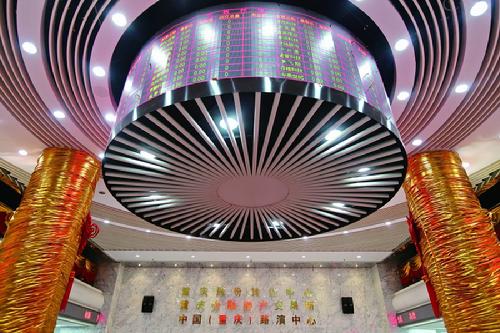
In 2010, Southwest China's Chongqing set up a financial assets exchange which was later suspended by the State Council and rectified.
(Ecns.cn) -- The mood of China's small lenders has brightened since the State Council announced that the government will encourage private lending companies in Wenzhou to join reforms, yet industry watchers warn that some firms are playing a dangerous capital game that undermines those reforms, notes the state-run Oriental Outlook magazine.
According to the latest statistics released by the People's Bank of China (the country's central bank), there were more than 4,200 small lending companies registered in China in 2011, but the number of individual loans under 50,000 yuan (US$7,930) issued by those companies last year only accounted for 1.86 percent of the total, while those above 500,000 yuan (US$79,300) accounted for 86 percent.
The statistics reveal that the vast majority of loans were issued to big enterprises instead of small entrepreneurs in the agricultural and rural economies, a fact that clashes with the government's reform initiatives.
Small firms, big loans
At a State Council executive meeting presided over by Premier Wen Jiabao on March 28, the government selected Zhejiang Province's Wenzhou, a city already known as the nation's private financing hub, to become a pilot zone for a series of financial reforms.
Wenzhou's large number of active private lenders and small businesses is the main reason for the government's decision to launch the pilot program there, with official statistics showing that private capital in Wenzhou amounted to 600 billion yuan ($95.2 billion) last year.
The pilot area should encourage and guide private capital to enter the field of official financial services, ensure smooth access to investment channels for private capital and improve financial services for small and micro-enterprises and rural areas, said Zhou Xiaochuan, governor of the central bank.
With the issue widely watched, all related stocks saw substantial gains in the following weeks. Zhejiang Dongri Limited Company, a local enterprise principally engaged in commodities distribution, property distribution and leasing, has continued to rally at the Shanghai Stock Exchange, all because of its stake in the Bank of Wenzhou (formerly the Wenzhou City Commercial Bank).
However, contrary to the government's intentions, some small lending companies still prefer to provide big loans, some of which can be worth tens of millions of yuan, said Dr. Liu Xiliang, an expert on private-financing issues.
But if an applicant hopes to apply for a loan of about 20,000 to 30,000 yuan (US$3,171 to US$4,758), the companies will probably behave coldly, said an insider.
Lending firm tricks
Small lending companies keep their interest rates within four times the rates of banks on their loan books, which are open to the public, said Liu. However, those figures vary greatly from their internal spending charts.
In 2010, Southwest China's Chongqing set up a financial assets exchange which was later suspended by the State Council and rectified. According to the Oriental Outlook, the exchange had been selling rights to the earnings of small loans, by which lending companies could better achieve financing.
In this sense, the exchange became a platform for dividing earnings from loans, which reflected the scale of interest rates set by most small lending companies.
In early 2012, small lending companies in north China's Shanxi Province were required to internally examine whether they faced embarrassing disclosures of hidden information. An open inspection was subsequently launched on April 9, which revealed that some lending companies charged interest rates higher than 30 percent.
Moreover, the owners of some small lending companies operate their businesses like pawnshops, charging high interest rates and lending money to anyone who can provide collateral. By doing this, the companies have become key players in an important corner of the country's economy.
Multiple-win situation
Apart from large loans and high interest rates, small lending companies are also working hand in glove with the banks, notes the Oriental Outlook.
When a company's bank loan nears maturity, staff from the bank will usually notify that company and urge payment. But if the company has difficulty paying off the loan, the staff are likely to contact small lending companies to take over.
In this way, banks can prevent bad loans and ensure the safety of their money, while small lending companies can make profits by providing loans at higher interest rates.
And although it may look unfair to businesses, they usually accept the approach in order to keep operating – even at the risk of losing ownership of their companies.
Small lending companies are benefitting greatly from such risky capital games, but the practice is creating uncertainty that threatens government plans to legitimize private lending and bring about better financing services for farmers.
On Thursday, a private lending registration service center was officially established in the city of Wenzhou. The center is charged with regulating the private lending market, controlling the risks of private lending, preventing illegal fundraising and protecting the interests of private lenders.

Copyright ©1999-2011 Chinanews.com. All rights reserved.
Reproduction in whole or in part without permission is prohibited.